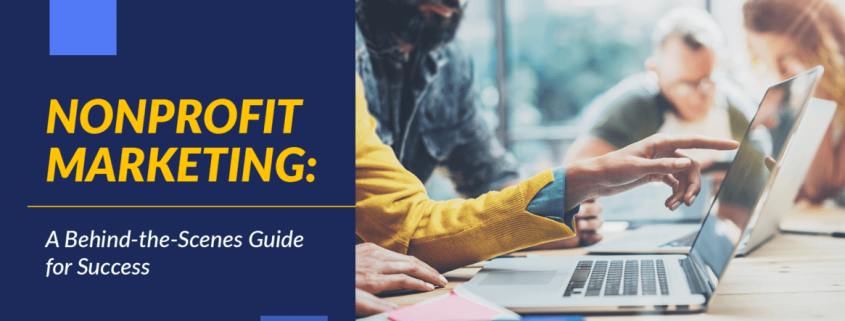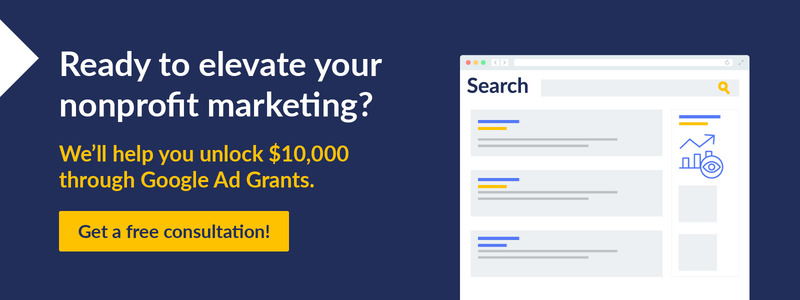Nonprofit Marketing: Proven Tips to Reach Your Supporters
Did you know it takes 18-20 points of contact to reach a new donor for the first time? For nonprofits, developing an effective multichannel marketing plan is key to spreading awareness, engaging new prospects, and deepening donor relationships. However, a lot goes into crafting the perfect strategy for your organization, from setting goals to your marketing data.
In this comprehensive nonprofit marketing guide, we’ll walk through everything you need to know to refine your marketing efforts. Here’s what we’ll cover:
- What is Nonprofit Marketing?
- How Much Do Nonprofits Spend on Marketing?
- 5 Steps to Create a Nonprofit Marketing Strategy
- Types of Nonprofit Marketing Channels
- Nonprofit Marketing Best Practices to Follow
At Getting Attention, we empower nonprofits to expand their nonprofit marketing capabilities with the Google Ad Grant. While we’ll explore that channel a bit more later, know that it’s a powerful addition to any nonprofit’s toolkit.
Regardless of your nonprofit’s size, budget, or staff resources, taking the time to optimize your current marketing strategy can go a long way toward securing more support for your mission.
What is Nonprofit Marketing?
Nonprofit marketing encompasses the diverse strategies and channels that nonprofits use to promote their causes, secure donations, attract new supporters, and retain existing ones. Effective nonprofit marketing amplifies the organization’s mission and fosters meaningful audience engagement.
Organizations often create nonprofit marketing plans to allocate their budgets, time, and efforts efficiently. This plan typically outlines the core mission, tone, target audience, preferred marketing channels, and branding elements, ensuring a cohesive approach to reaching supporters.
Inbound vs. Outbound Marketing
There are two main approaches to nonprofit marketing:
- Inbound marketing refers to methods of attracting prospective supporters’ attention through unpaid promotion or content production. Commonly, this includes search engine optimization (SEO), blogging, and organic social media posts. SEO, in particular, helps your content rank highly on search engine results pages, making it easier for potential supporters to find your nonprofit online. It’s especially useful for organizations that sell programming or services.
- Outbound marketing, often referred to as “advertising,” relies on paid media to reach potential supporters. You might use Google Ads, social media ads, radio ads, or any other paid outlet to promote your mission.
While inbound marketing attracts potential supporters whose interests align with your mission, outbound marketing can extend your nonprofit’s reach to people who might not otherwise encounter your cause. Finding the perfect balance between inbound and outbound channels enables you to cast a wider net and reach more prospects.
Benefits of Nonprofit Marketing
A thoughtful and comprehensive nonprofit marketing plan allows your nonprofit to:
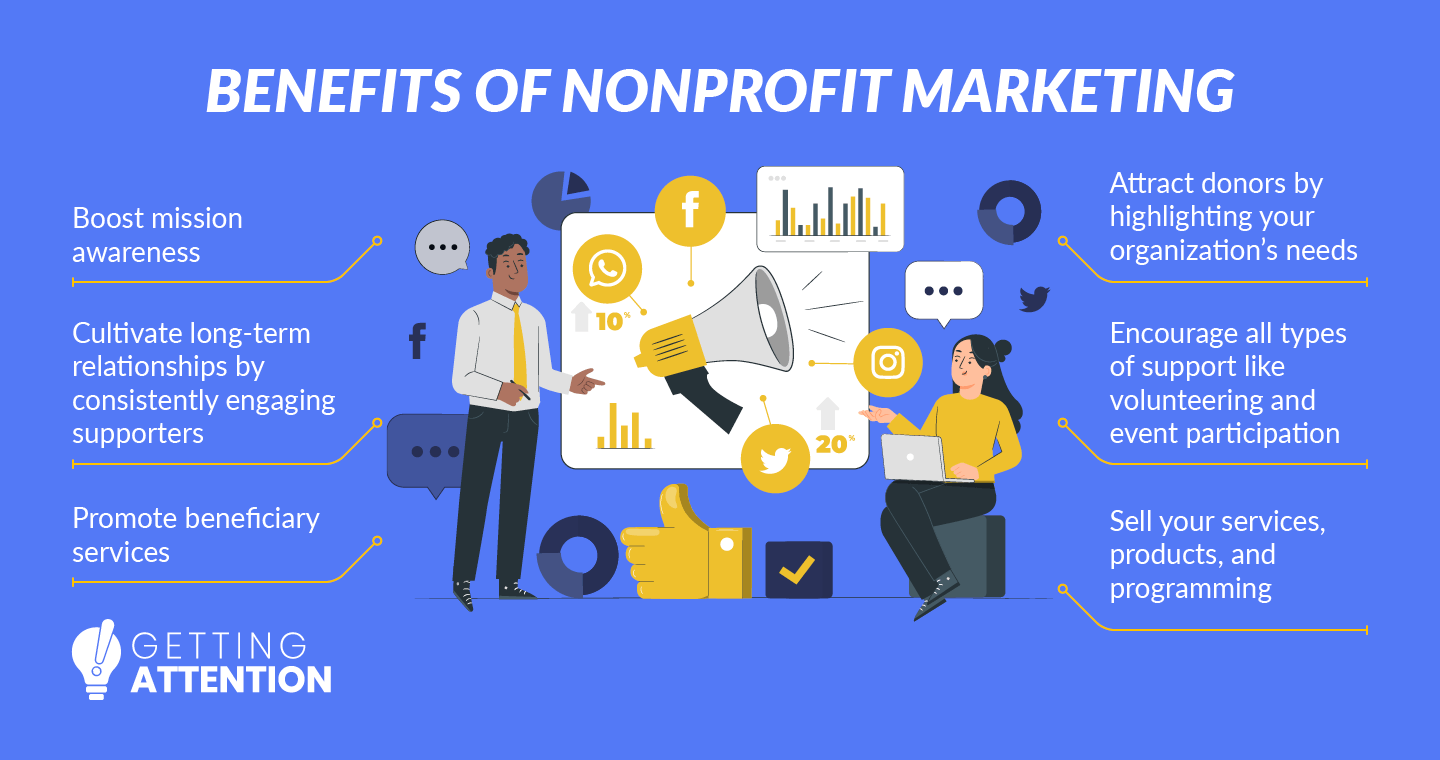
- Boost awareness. Effective nonprofit marketing increases mission awareness, ensuring more people understand your goals, why they matter, and the work you’re doing to achieve them. This heightened visibility can attract new supporters.
- Increasing funds. By spreading cause awareness, you’ll naturally receive more donations from people who believe in your mission. Strategic marketing campaigns can highlight specific needs and inspire generosity.
- Cultivate long-term relationships. Successful marketing builds lasting relationships with donors, leading to more recurring donations and more revenue. According to Nonprofits Source, the average monthly online donation is $52 (totaling $624 per year), compared to an average one-time gift of $128. Consistent engagement nurtures loyalty.
- Attract all types of support. In addition to securing more donations, marketing can enhance volunteer recruitment, event participation, membership signups, and other forms of engagement.
- Promote your services to beneficiaries. With a comprehensive nonprofit marketing strategy, you can effectively promote services to beneficiaries. Plus, understanding your nonprofit’s services can inspire your supporters to give.
- Sell your services, merchandise, and programs. Many nonprofits and associations also sell services, merchandise, and programming, like professional development certifications and training. Get these opportunities in front of prospective customers to raise more money.
Overall, marketing impacts every area of your organization, making it essential for achieving your mission and inciting real change in your community.
Nonprofit Marketing Challenges
Effective outreach doesn’t come without its challenges. By understanding common obstacles nonprofits face, you can plan ahead and minimize potential difficulties further down the road:
- Establishing trustworthiness. Many people contribute to nonprofits to make a difference in the world. To inspire potential donors, assure them that your organization is legitimate and worthy of their financial support.
- Communicating your mission. Nonprofits must communicate their mission and values to capture potential donors’ interest. This can be particularly challenging if your mission involves complex social issues.
- Selling products and services. Many nonprofits offer products or services as part of their mission or as a means of fundraising. Marketing these offerings requires a clear value proposition and effective promotional strategies to get them in front of customers.
- Working on a limited budget. Even with a well-defined mission and compelling story, budget constraints may hinder your marketing efforts. This can limit your advertising options through paid outlets and necessitate creative, cost-effective strategies.
- Appealing to different demographics. Your potential supporters have varying preferences and interests. For example, older donors might prefer traditional print outreach methods while younger audiences might lean toward text or social media. Tailoring your messages to resonate with diverse audiences can be challenging but is crucial for broadening your support base.
Fortunately, your organization can overcome all of these challenges by laying a solid foundation with your nonprofit marketing plan and following the best practices we’ll explore later on in this guide.
How Much Do Nonprofits Spend on Marketing?
While there isn’t a one-size-fits-all answer to how much an organization should allocate for marketing, there are several methods you can use to create an effective budget:
- The percent method. Allocate 5% to 15% of your total budget to marketing, communications, and fundraising. Many organizations group these essential activities together as a single line item in their budget. This method makes it easy to scale your nonprofit marketing budget as your organization grows.
- The dollar method. Choose a set dollar amount for marketing, communications, and fundraising based on past expenditures. This method eliminates guesswork and makes spending expectations clear.
- The incremental method. To avoid starting from scratch, take the current period’s budget and revenue into account. Then, adjust each line item by incremental amounts to create your next budget.
Nonprofits may cut marketing when resources are tight, but promoting your mission is essential for staying connected with donors and driving gifts to stay operational. Instead, opt for low-cost communication channels or apply for a grant.
Whether you’re facing budgetary constraints or simply want to reduce costs, explore our guide to applying for Google Ad Grants to tap into free advertising money.
5 Steps to Create a Nonprofit Marketing Strategy
Crafting an organized nonprofit marketing strategy connects you with supporters and beneficiaries. Your strategy should outline all the information you need to meet your audience’s needs and spread awareness.
If you partner with an external agency, they will guide you through these steps. Be sure to choose professionals experienced in your sector who understand your mission. For example, churches should hire agencies that specialize in religious organizations, as they understand the unique challenges and opportunities faith-based groups face. They can tailor messaging, outreach strategies, and campaigns that resonate with the church’s congregation and community, helping to grow the organization’s ministry.
1. Perform a Marketing Audit.
Start by getting a sense of your current marketing capabilities and available resources. That way, you can start thinking about the changes you’ll need to make.
Gather past outreach materials and campaign metrics to conduct an audit on your most recent outreach efforts. A nonprofit marketing audit often consists of conducting a SWOT analysis, which stands for:
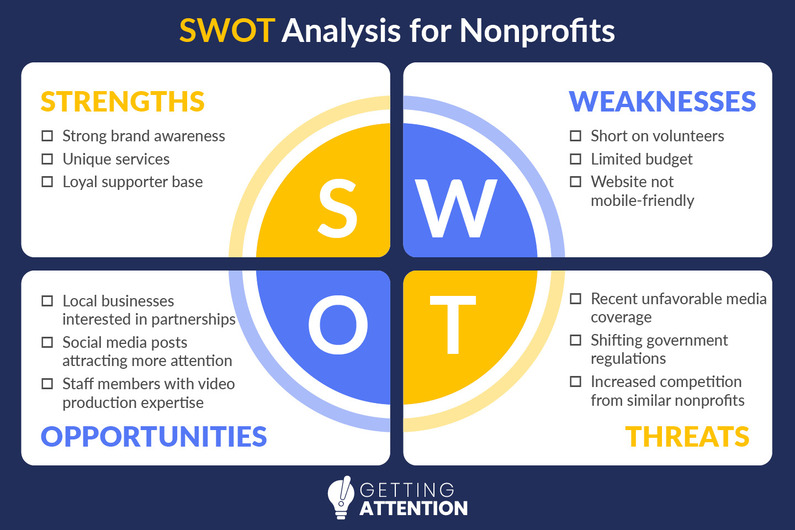
- Strengths. List any areas where your nonprofit excels compared to competitors. For example, you may have unique services, strong brand awareness, or an incredibly loyal supporter base.
- Weaknesses. List anything that hinders you from achieving your nonprofit marketing goals, such as a limited budget or a poor digital presence.
- Opportunities. Include any external factors that give you an advantage over competitors. For instance, your mission could be prevalent in the news or you might have a strong pipeline of corporate sponsors.
- Threats. This includes any external factors out of your control that negatively impact your nonprofit. These factors could be anything from unfavorable media coverage to shifting government regulations.
Analyze your results and create a plan for playing to your strengths, overcoming any weaknesses, increasing your opportunities, and mitigating any threats.
2. Define Your Marketing Goals.
Your nonprofit marketing strategy should support your overall goals. Are you trying to raise funds? Encourage volunteering? Garner fundraising event registrations? Every marketing campaign needs a concrete goal and target action to be successful.
When outlining your nonprofit marketing strategy goals, use the SMART method:
- Specific. Define the exact goal your nonprofit is aiming to achieve and identify how achieving it will support your mission.
- Measurable. Your goal should have key performance indicators (KPIs) attached to evaluate progress.
- Attainable. Given your organization’s current standing (e.g., time, money, expertise), choose a goal that you can realistically achieve.
- Relevant. Your chosen goal should contribute to your organization’s overall success. For example, increasing volunteer registrations clearly impacts your organization more than reaching a certain number of likes on an Instagram post.
- Time-based. Provide a realistic deadline for achieving your goal. Then, create milestones along the way.
From here, list your goals by priority. Clear nonprofit marketing goals will power greater outcomes for your cause.
Examples of SMART Goals
The best way to understand the SMART framework is to explore examples:
- Increase sales of educational curriculum by 25% over the next 12 months by implementing targeted marketing campaigns, including SEO and social media promotions. Track the number of units sold each month, and leverage partnerships with schools and educational organizations to reach a broader audience.
- Boost volunteer sign-ups by 10% by the end of the year via targeted outreach campaigns and improving our volunteer management strategies to enhance program delivery.
- Gain 50 new monthly donors within the next quarter by leveraging existing donor engagement strategies and personalized outreach.
- Double the number of participants in our annual fundraising event by leveraging Google Ads, SEO strategies, and community partners to encourage registrations.
These goals start with a core objective and build out the details. From promoting events to selling programming, effective nonprofit marketing can help you increase visibility and drive action. You just need SMART goals and technology to track your progress.
3. Understand Your Audiences.
Focus your nonprofit marketing strategy on who you’re trying to reach. Outline your nonprofit’s current and target audience. For example, if your nonprofit sells religious curricula to churches, your target audience would include church leaders, educators, and parents. Or, let’s say your parks and recreation association wants to sell summer camp registrations. Your audience would primarily be parents and guardians looking for engaging educational summer activities for their children.
Segment your audience members according to characteristics such as:
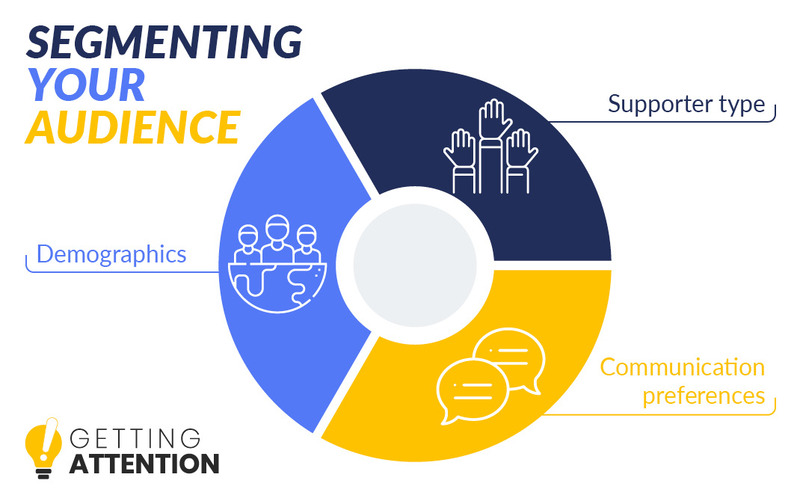
- Supporter type, including first-time donor, recurring donor, major donor, customer, volunteer, or corporate partner.
- Preferred communication method, like email or direct mail.
- Demographic data, including age group, geographical location, and education level.
When you understand who your supporters are, you’ll ensure content aligns with their needs, preferences, and interests, making them more likely to engage. In fact, segmenting digital campaigns produces up to 760% more revenue!
Remember, the goal of segmentation is to ensure your communications are targeted, so understand each group’s needs to create content catered to them. This might involve planning new events, writing new blog content, or trying new media formats like video.
4. Create and Share A Compelling Message.
There are hundreds of ads and messages online, all competing for your supporters’ attention. To make your messages stand out from the crowd, use the CRAM rule to bring your powerful marketing ideas to fruition and connect with supporters. Your communications should be:
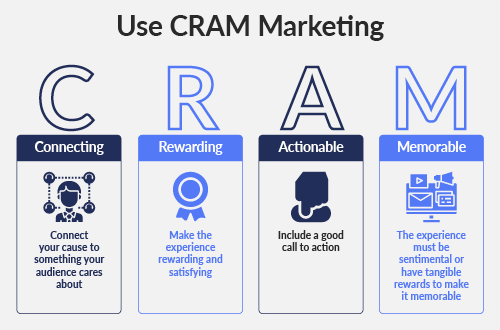
- Connected to a cause. Link your nonprofit’s mission with something your audience cares about.
- Rewarding. Readers should feel fulfilled or inspired reading your message.
- Actionable. Include a clear call to action to outline readers’ next steps, whether that’s donating, volunteering, registering for an event, or something else.
- Memorable. Use storytelling and statistics to leave a lasting impression on your readers.
Plan out the tone of your message, specific calls to action you’ll use, and any visual branding elements. Then, choose your nonprofit marketing channels and start sharing your outreach.
5. Track Results and Make Adjustments.
Every nonprofit marketing strategy needs a way to measure performance, so you’ll be able to identify your areas of strength and areas for improvement. Here are some examples of KPIs for different channels you might track:
- Click-through rate (CTR) for Google Ads
- Email opens for email marketing
- Video views or likes for video marketing
- Likes, shares, and comments on social media
- Page views or time on site for your website
- Number of downloads for content marketing
Data is the backbone of your nonprofit marketing efforts. It ensures your campaigns perform well, provides insights for future improvements, and serves as a valuable resource for supporters interested in your impact.
Types of Nonprofit Marketing Channels
The specific nonprofit marketing channels you use are critical to reaching your donors and meeting new prospects. While you don’t need to leverage every platform, a multichannel marketing approach allows you to connect with as many supporters as possible.
Let’s walk through some of the most popular channels that can catapult your nonprofit marketing efforts forward.
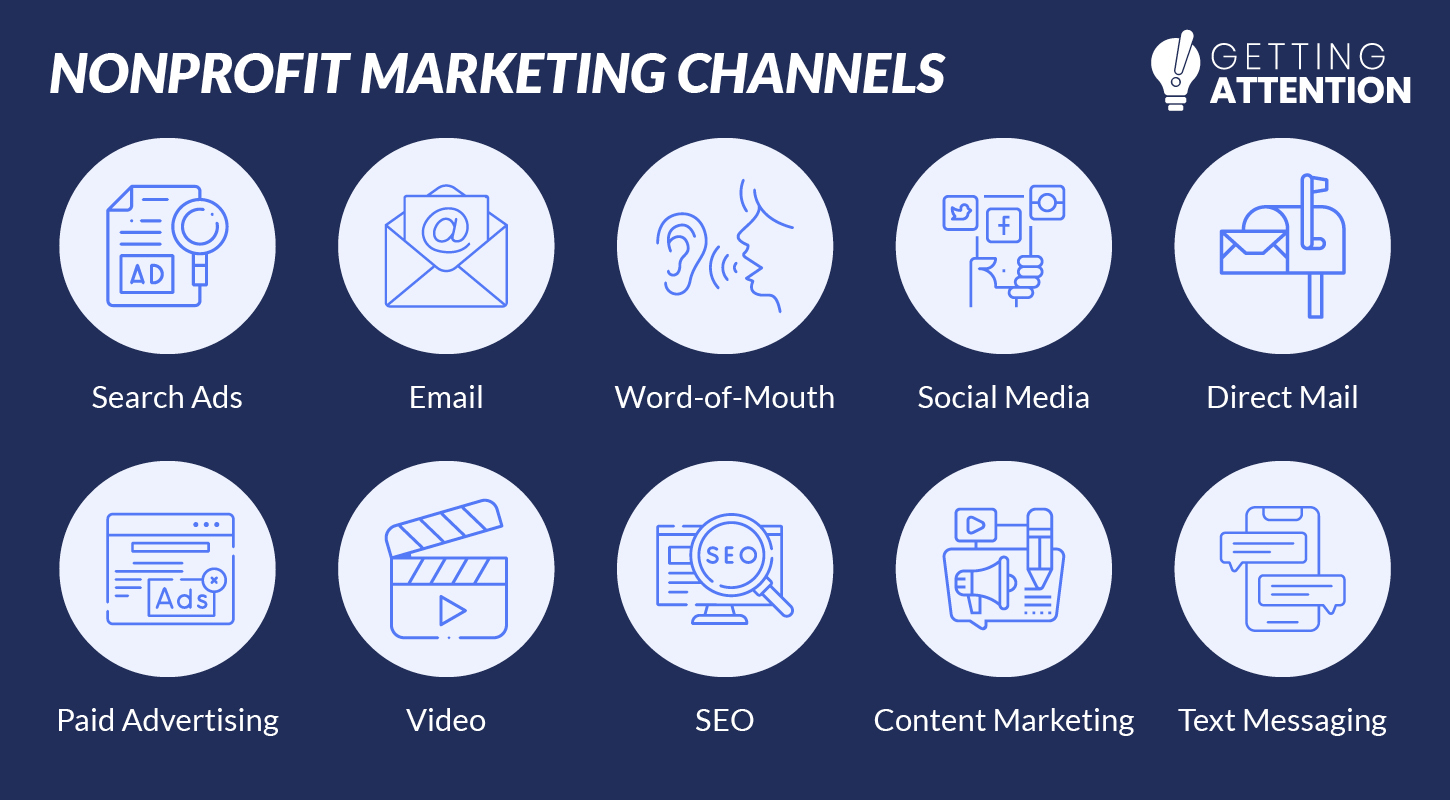
Search Ads
To enhance marketing results, many nonprofits leverage Google Ads, a platform where organizations display advertisements promoting their services, initiatives, and educational content. Google places these ads at the top of search engine result pages to expand each organization’s online presence.
Many nonprofits apply for the Google Ad Grant, a technology grant that provides nonprofits with $10,000 in monthly ad credits. These credits can be used to bid on valuable keywords their prospects are searching online and promote their website content with Google Ads.
The best part? Any eligible nonprofit that complies with Google guidelines can leverage this grant. For example, if your church is eligible, you can apply for and receive the Google Ad Grant. It automatically reactivates every month, too. As long as you comply with the program’s rules, you’ll add up to $120,000 to your nonprofit marketing budget each year.
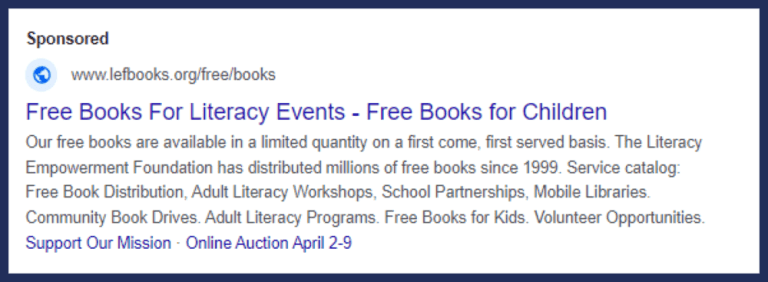
However, a lot goes into determining your nonprofit’s eligibility, applying, and making the most of the program. That’s where an expert Google Grants agency can step in.
The specialists at Getting Attention will champion your cause at every turn. We’ll learn about your specific nonprofit marketing goals and manage the entire Google Grant process, allowing you to focus on your mission with confidence that your Google Ads are in expert hands.
Nonprofit Advertising
While people commonly interchange “advertising” and “marketing,” nonprofit advertising is actually a specific subset of nonprofit marketing that refers to using paid channels to promote your mission. Some of the most common nonprofit advertising channels include:
- Search ads (like Google Ads)
- Radio and TV ads
- Social media ads
- Influencer advertising
Advertising can amplify your content to a broader audience, even those who aren’t actively researching nonprofits. With a strategic approach, outbound marketing is achievable, even on a limited budget!
Similar to Google, there are many other advertising platforms with free or discounted options for nonprofits. Explore our full list of nonprofit advertising examples to get a sense of how similar nonprofits tap into paid ads without spending too much.
Website
Your website not only hosts valuable information about your organization but also provides engagement opportunities like online giving, event registration, and more. It’s often the first place prospects go to learn about your mission and where long-term supporters go to show support.
To maximize site traffic, implement SEO strategies. Optimizing your website for search engines helps attract attention to initiatives like your revenue-generating programming. When updating your nonprofit website, try these SEO practices:
- Keyword Research: With tools like Google Keyword Planner, identify relevant keywords your target audience uses when searching for information related to your cause. Use these keywords naturally in your content, headers, and meta descriptions.
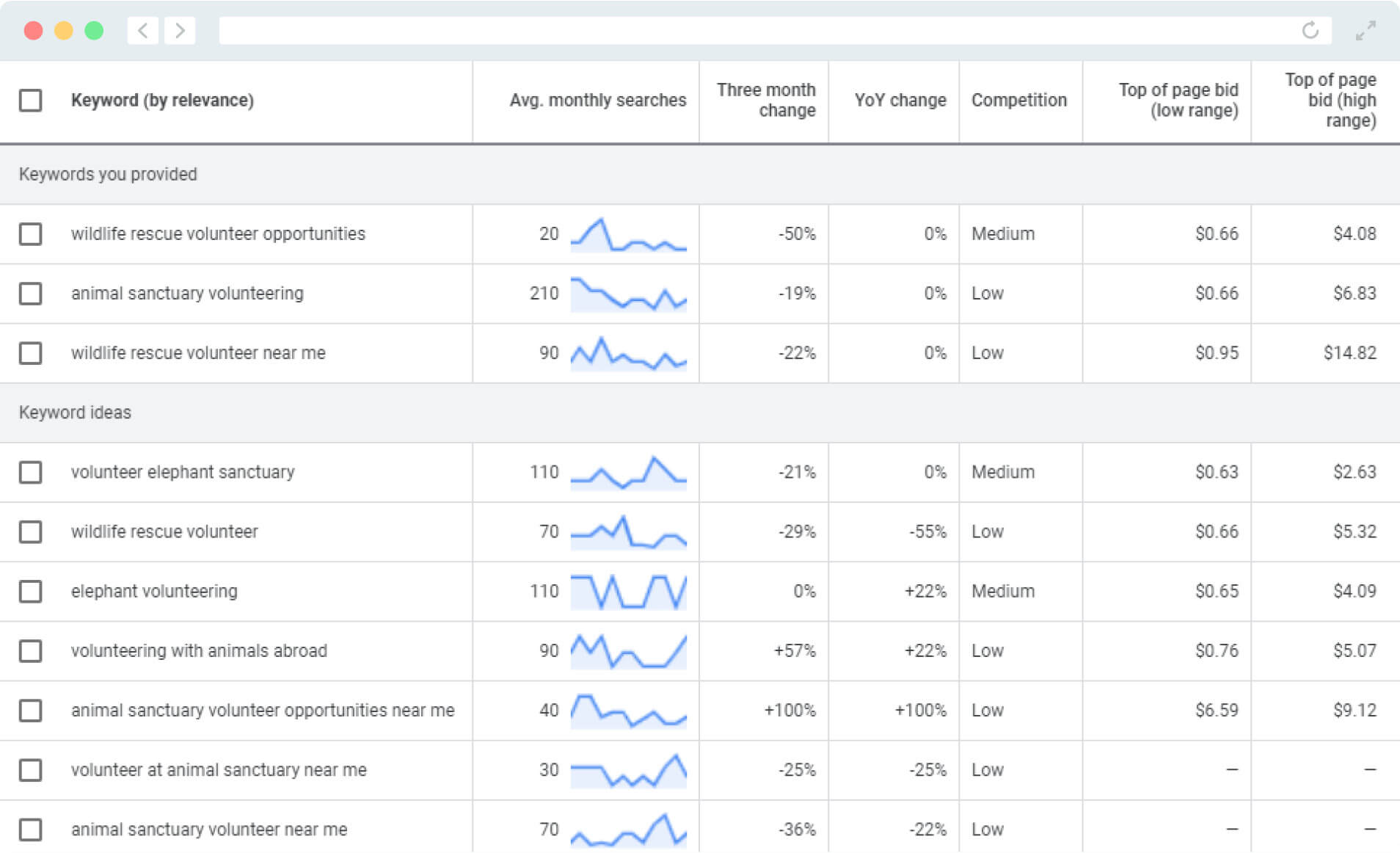
- Quality Content: Create high-quality, informative content that addresses your audience’s needs and interests. This can include blog posts, service pages, mission updates, and educational resources.
- Technical Improvements: Ensure your website has an optimal user experience (UX) and can be easily crawled by search engines. Take steps like optimizing site speed, using mobile-responsive design, securing your site with HTTPS, and eliminating broken links.
- Backlinks: Encourage reputable websites to link back to your content. Backlinks from trusted sources can boost your site’s credibility in the eyes of different search engines.
Sometimes nonprofits create blogs to drive traffic and post meaningful content about their organizations. This is also a great way to cultivate a community and act as a go-to resource for supporters. Consider blogging about nonprofit industry trends, mission updates, and your nonprofit’s recent events or campaigns.
Using A Digital Marketing Agency
To maximize your website’s potential, turn to a dedicated SEO agency that understands organic digital marketing channels. Nexus Marketing, for instance, helps nonprofits and associations increase revenue by selling their programming, products, and services.
Their value-add marketing services include:
- Keyword-optimized content creation to showcase your services, products, and thought leadership
- Technical SEO improvements to improve aspects of your website like crawlability and mobile-friendliness
- Off-site link-building strategy development to establish your brand’s authority
- Video production services to showcase your revenue-generating services, programs, and products and add valuable multimedia content to your site
- Email marketing campaigns to guide visitors through their journey and drive traffic to key pages on your website
With 10+ years of experience in SEO for mission-driven organizations, Nexus Marketing will help attract and convert your target audience into customers. They can help you strengthen your website and reach your target audiences through search engines, high-visibility webinars, and promotion through their trusted partners in the industry.
Nonprofit Email Marketing
Email is a reliable channel for nonprofit marketers, allowing them to connect with all types of supporters, from first-time donors to those who have been giving regularly for years.
Some impactful ways to leverage email marketing for nonprofits include:
- Create a regular newsletter. Provide supporters with updates about your organization, the latest industry news, success stories from your programs, supporter spotlights, volunteer opportunities, and anything else going on at your nonprofit.
- Send monthly emails about donation needs and opportunities to increase donor value over time. Tailor requests to ask each donor for a reasonable upgrade from their last gift. For example, if a supporter gave $25 last month, request $30 instead of $100. Also, remove recurring donors from your monthly request list since they are already giving regularly.
- Create intriguing subject lines. Tease content inside to give readers a reason to click, and make sure each subject line is the right length. If it’s too long, it’ll get cut off. If it’s too short, you won’t provide enough value. For context, subject lines of 61-70 characters have the highest open rates.
- Follow up with appreciation emails. When a supporter donates, signs up to volunteer, or shows some other form of support, you should automatically send out a thank you email. Personalize these emails to address each supporter by name and reference their specific contribution.
On average, email generates $36 for every $1 spent. This high ROI makes it clear that this nonprofit marketing channel is worth investing in.
Word-of-Mouth Nonprofit Marketing
When your volunteers and donors feel strongly about your cause, they’ll want to share your important work with friends and family members who may be interested in supporting your nonprofit, too!
Peer-to-peer outreach can be incredibly powerful. In fact, 88% of consumers trust recommendations from loved ones over any other type of marketing. Encourage your supporters to reach out to their personal networks, post online about your cause, and share your organization’s social media posts to spread the word.
One powerful way to encourage peer-to-peer referrals is nonprofit eCards. They’re an easy and interactive way to broadcast your mission, activities, and successes.
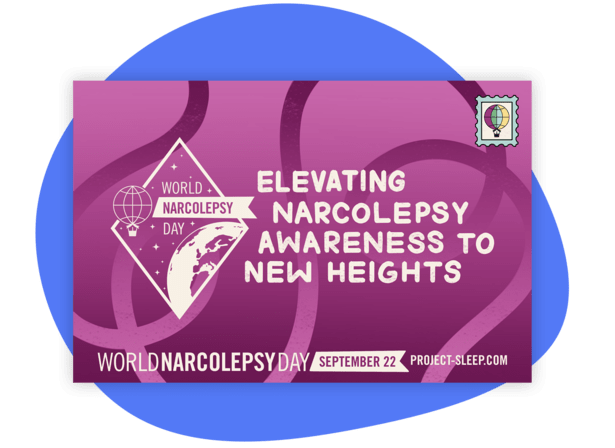
Create designs for every occasion to encourage referrals year-round. Here are just a few ideas to get started:
- Birthday fundraising eCards that encourage supporters to give in a loved one’s name as a way to wish them a happy birthday.
- Holiday eCards to spread some holiday cheer during special times throughout the year.
- Thank-you eCards to help supporters express their gratitude.
- Tribute eCards for individuals to give in honor of their loved ones.
- Mission awareness eCards to call attention to your work during a cause awareness campaign.
- Event invitation eCards to help supporters invite their loved ones to one of your nonprofit events.
Once you design your nonprofit eCards, you can offer them for free, sell them for a set price, or give them in exchange for donations. No matter what, people will be excited to browse your collection and share a cause that’s close to their hearts.
Social Media Marketing for Nonprofits
By 2027, the global number of social media users is expected to skyrocket to 6 billion. Social media’s rising prevalence makes it one of the most viable channels for marketing your mission.
Not only is social media affordable, but it’s also a key way to connect with supporters on a deeper level. You can engage with followers, encourage them to comment or repost content, and build a brand personality that they enjoy interacting with.
Here are tips to leverage social media in your nonprofit marketing strategy:
- Share news about your organization and cause.
- Boost brand awareness and recognition.
- Post calls to action for online gifts, event registrations, and volunteer signups.
- Post about your committed donors, employees, and volunteers.
- Create accounts on sites where your supporters are most active, like Facebook, Instagram, TikTok, X (formerly Twitter), or LinkedIn.
Whether you use TikTok for connecting with younger generations or Facebook for its long-form posts and its fundraising features, social media is a channel worth optimizing for your nonprofit marketing.
Direct Mail Marketing
While email marketing response rates are typically 1%, direct mail response rates hover around 9%, making it a highly valuable and personalized marketing channel.
For nonprofits, direct mail marketing and fundraising involve writing, printing, and sending out hard copy requests for funds, event invitations, or thank-you letters to your passionate supporters. These letters arrive in your supporters’ mailboxes and provide a tangible connection to your organization—especially when compared to opening an email.
Use these tips to inspire action with direct mail:
- Lean on storytelling. Perhaps the most unique aspect of direct mail is its personal touch. This is a key opportunity to connect with donors through storytelling. For example, you could describe the story of a family your nonprofit helped to get readers eager to give. After all, people remember stories 22 times more than facts alone.
- Use compelling visuals. Weave your visual and written elements together to break up blocks of text and support your call to action. This applies to everything from your letters to your fundraising flyers. Whether you use photos of real people or graphics to illustrate different points, the visuals you choose should be reinforce your messaging.
- Combine direct mail with digital marketing. Enhance your direct mail marketing by conducting it alongside your digital marketing efforts. Be sure to include easy ways for direct mail readers to connect online by including a QR code to your donation page or adding social media details to encourage engagement on various platforms.
As long as it aligns with recipients’ communication preferences, direct mail can both benefit your nonprofit and show donors that you care. Consider partnering with a direct mail marketing company to facilitate the process of writing and sending your letters.
Nonprofit Video Marketing
From short videos on TikTok to longer content on YouTube, many nonprofits have found success in using this form of media to promote campaigns, events, and their mission in general.
Here are some reasons why video marketing for nonprofits is so valuable:
- Inspirational. Well-edited videos, supplemented with evocative music, do really well when it comes to appealing to viewers’ emotions.
- Shareable. 51% of people are more likely to share videos than any other marketing content, including social media and blog posts.
- Entertaining. According to DataReportal, watching videos is one of the top online activities among working-age internet users around the world, with 92.8% watching online videos every week.
You can incorporate video marketing across your nonprofit website, in social media posts, and in email content. For instance, you can send an event invitation with a video teaser or record a video featuring someone your nonprofit has helped to show donors how much their donations make an impact.
Bonus Tip: Because of their file format, videos can potentially slow down a website. When publishing videos to your website, turn off auto-play to minimize any slowdowns!
Content Marketing for Nonprofits
Content marketing is all about creating valuable and promotable nonprofit content to build your nonprofit’s reputation. While this content will likely live on your website, you can also create specific content for emails or host a downloadable gated resource.
Common types of content you might create include:
- Educational content about your mission, cause, and industry trends.
- SEO blog content to get your online content ranking higher in search engines.
- Easily shareable content that encourages your audience to send it along to their friends.
- Content that is easily reusable, like attaching a downloadable resource to an email message.
Plus, your content marketing materials can be used for other nonprofit marketing efforts, whether you promote it via email, Google Ads, or social media. Consider creating a dedicated team focused on content copywriting.
Text Message Marketing
With a 99% open rate and 90% read rate within just three minutes of sending, text message marketing is one of the best ways to promote a campaign and reach your audience where they already are.
To use text marketing, consider investing in a comprehensive text-to-give tool. Tatango’s nonprofit text messaging guide recommends looking for a text messaging provider with the following features:
- A2P (Application to Person) messaging. This feature allows you to send a single message to hundreds or thousands of supporters at once, saving your nonprofit time.
- Ability to handle fast messaging speeds. A provider with a high message-per-second rate will ensure that your campaign reminders reach supporters moments after you send them.
- Security for your campaigns. Your text messaging provider should come with security measures like two-factor authentication, secure sending, and automated logout to protect sensitive data.
- Subscriber segmentation. Divide your contact list into subgroups based on characteristics such as recency of opting into your text messaging campaign, donation frequency, and average giving amount.
With a secure and user-friendly text messaging platform, your nonprofit can confidently deliver a high ROI, engage supporters year-round, and leverage contextual giving.
Contextual giving occurs when a donor gives the moment they’re inspired. For example, someone at a fundraising event might see a text-to-give number on signage and decide to give immediately. Without this option, they might delay until home, reducing the likelihood of completing the donation.
Nonprofit Marketing Best Practices to Follow
Your nonprofit marketing strategy encompasses several moving components, from crafting your messaging to picking the channels you use. Let’s explore general best practices that can help you hone your marketing efforts:
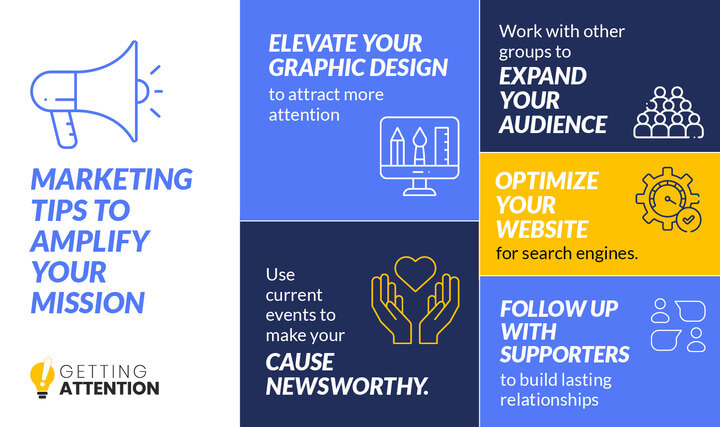
Optimize Your Website for Search
Your nonprofit’s website is the hub of its digital marketing efforts. Optimize it for search engines to ensure potential supporters, customers, and beneficiaries can find it.
While your content is incredibly important, technical SEO lays the foundation for how search engines crawl, index, and rank your site. Let’s explore a few technical improvements to ensure your website can be found and indexed:
- Remove broken links. Broken links are hyperlinks that lead to non-existent web pages, typically due to them being removed from the site. Regularly audit your website and fix broken links to ensure seamless navigation and make it easy for search engines to crawl your content.
- Avoid redirect chains. Redirect chains occur when a URL redirects to another URL which then redirects to yet another URL. This creates a sequence that can slow down your site and confuse search engines. Ensure that each URL points directly to its final destination without unnecessary intermediate redirects.
- Improve site speed. A fast-loading website provides a better user experience, so search engines use speed as a ranking factor. Use tools like Google PageSpeed Insights to identify issues slowing down your site. To decrease loading times, compress and properly size images, enable browser caching, and minimize CSS.
- Secure your website. Obtain SSL certification to secure data exchanged between your website and visitors. Search engines prioritize secure websites, and users are more likely to trust and engage with a secure site.
To find issues on your website, use a website crawler tool like Screaming Frog. Just know that fixing some of these issues can be challenging if you don’t have an in-house web developer. That’s where an SEO agency like Nexus Marketing can step in to locate, prioritize, and fix the most pressing issues that are harming your nonprofit’s website.
Elevate Your Graphic Design
Regardless of whether someone’s scrolling through their social media feed or passing by a bulletin board with your fundraising flyer pinned to it, they’re more likely to notice marketing collateral that features eye-catching graphics and vibrant colors.
Considering that people retain 55% more information when paired with an image, effective visuals make your content more memorable to prospects, too. Here are a few crucial areas where graphic design comes into play:
- Your logo. Your nonprofit’s logo appears on everything from your fundraising letters to your business cards. Prospects immediately associate it with your organization.
- Website design. The graphics you include on your website are just as important as your site’s layout. You’ll want to include everything from images of beneficiaries and volunteers to artistic elements that emphasize the most important aspects of each page.
- Merchandise. If you sell t-shirts, mugs, or any other fundraising products, feature effective designs on them. Visually-appealing graphics will make the buying experience much easier for prospects who come across your ads for them.
- Printed materials. Effective graphic design is just as important for your printed collateral, such as your fundraising letters, flyers, and service brochures.
If you have limited graphic design expertise, reach out to an experienced graphic designer. Those with experience in the mission-driven space, such as Kwala, understand exactly what it takes to make charitable causes stand out. Their team will work with yours to create anything you request, including flyers, logos, stickers, and even fundraising product designs.
Take a look at this postcard that they designed for the Wildlife Rescue Group:

Well-designed materials like this will reel supporters in and drive action, whether you want people to donate, volunteer, or get involved in some other way. Turning to a professional graphic designer allows you to create marketing materials that resonate with supporters.
Use Current Events
Boost your nonprofit’s marketing efforts by leveraging what is currently going on in the world to create urgency. Is there a story related to your cause in the news? For instance, if your organization is contributing to relief efforts in the wake of a natural disaster, connect your mission to this broader issue and boost public awareness around your work.
Highlight all the work your organization aims to achieve so that potential donors feel inspired to contribute toward your impact.
Follow Up With Supporters
Successful marketing requires more than one-way communication. Cultivate relationships with your donors and volunteers by implementing strategies to start ongoing conversations. This doesn’t mean you need to exchange text messages with each supporter to keep them engaged. Rather, your nonprofit just needs to respond to the actions supporters take to show that you see and value their contributions.
Some basic occasions for reaching out to a supporter include:
- After they’ve made a gift
- After they’ve attended an event
- On their birthday
- On their anniversary with your nonprofit
- On a holiday or at year-end
- Asking for their feedback in a survey
Your follow-up process can also benefit from a multi-channel approach. For example, personalized donor thank-you emails make it possible to show your appreciation quickly. Then, you can send a card or give donors a phone call a few days later when your nonprofit has time set aside for donor outreach.
By reaching out often, you’ll be able to retain more donors and convince lapsed donors to get involved again.
Work With Other Groups
Your nonprofit has worked hard to establish its audience, and you can expand your reach by tapping into other organizations’ audiences. Well-known groups and individuals can introduce your nonprofit to new supporters. If they agree to a marketing partnership, they can handle part of the marketing efforts on your behalf.
A few third parties to consider include:
- Influencers. Influencer marketing is on the rise. The majority of these influencers have smaller (between 10,000 and 100,000 followers and some with even less than 10,000) but highly specific audiences with interests relevant to the nonprofits they support. For example, an animal rights group might partner with a beauty influencer to discuss the importance of buying cruelty-free products.
- Businesses. Corporate philanthropy comes in many forms, including marketing support. Ask businesses to sponsor specific events or campaigns by promoting your nonprofit to their audience. In exchange, you’ll promote the businesses’ products and services to your audience. Like with influencers, look for businesses with audiences likely to be interested in your nonprofit’s cause, such as an animal shelter partnering with local dog groomers.
- Other nonprofits. Nonprofits can work together to connect their audiences with one another. Partner with local nonprofits in your area to host joint events and campaigns. In exchange for them promoting your cause, you can raise awareness for theirs in return.
Before partnering with a third party, thoroughly vet them. After all, your partnership will reflect on your nonprofit, so be sure they are reputable, trustworthy, and likely to present your nonprofit in the best light.
Wrapping Up
Marketing your mission is key to your organization’s ongoing success. From choosing the right channels to keeping up with the latest trends, crafting a strong nonprofit marketing strategy takes plenty of forethought.
Whether you choose paid outlets like search ads or organic outlets like email, there’s a lot you can do to stand out. As you craft your strategies, check out these resources to keep learning:
- Google Grants Eligibility: Is Your Nonprofit Eligible? Google Ads can be a powerful addition to your nonprofit marketing strategy. Find out if you’re eligible for the Google Grants program with this guide.
- What Makes a Great Google Grant Agency: Best Partners. Learn how experts at a Google Grant agency can support your marketing efforts in this guide.
- Digital Card Ideas To Engage Your Nonprofit’s Supporters. Your nonprofit can share digital cards to promote your mission and connect with new audiences. Learn the fundamentals of this creative nonprofit marketing tactic.
